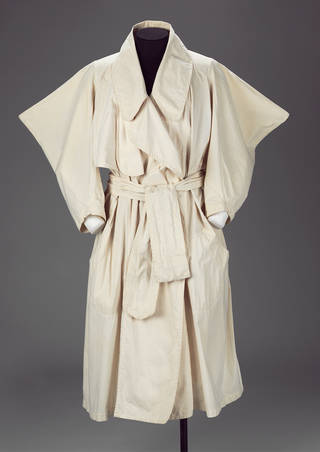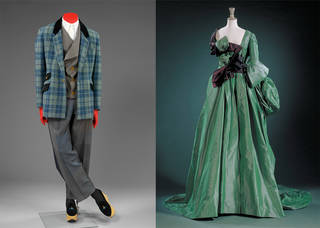I take something from the past that has a sort of vitality that has never been exploited – like the crinoline – and get very intense. In the end you do something original because you overlay your own ideas.
Westwood was renowned for her parodying of English looks, her innovative take on traditional tailoring and use of materials such as tartan and Harris Tweed. Even during the Punk years, when she and collaborator Malcolm McLaren created raw, deconstructive street fashion, Westwood's designs referenced historical styles. 'Bondage', in a sense the archetypal Punk look, features many finely made elements, including a loop-hung belt that echoes military wear of the early 20th century. This same attention to detail is seen in the Buccaneer jacket for the Pirate collection (Autumn/Winter 1981 – 82), another iconic look from Westwood's early career, which features technically assured dropped armholes and slash-cut sleeves.

Inspired by an 18th-century engraving of a pirate, the Pirate collection was named for the way it 'plundered' history, with breeches-style Buccaneer trousers, striped fabric and billowing shirts. In Witches, a collection for Autumn/Winter 1983 – 84 (and Westwood's last collaboration with McLaren), she reinterpreted the men's trench coat. This outsized, unisex mac exaggerated the cuts of a 'classic' garment that had been popularised after being worn by officers in the First World War.

The Mini-Crini, designed for a collection of the same name in 1985, combines the construction of the Victorian crinoline with the modern mini-skirt. The bell-like skirt offers a cheeky reworking of one of the 19th-century's most famous garments, and became one of Westwood's most iconic looks.
Probably the most influential of Westwood's 'borrowings' from history is the corset. She first made daywear of corsetry when creating fetish-wear collections at SEX in the 1970s, then turned the corset into refined outerwear in her couture collections of the late 1980s, including Harris Tweed (Autumn/Winter 1987 – 88) and Time Machine (Autumn/Winter 1988 – 89).

Once Westwood split from McLaren in 1983, she moved away from street fashion and fully indulged her love of looking to the past. Her Harris Tweed collection was a celebration of traditional tailoring, inspired by a young girl Westwood had spotted on the London underground wearing a traditional wool jacket. The collection also drew on London's famous Savile Row tailors, and toyed affectionately with the traditions of the English upper classes. Continuing in this vein, the Time Machine collection presented a revival of the Norfolk Suit. First fashionable in the 1860s, this highly structured outfit, consisting of a belted jacket and matching knee breeches, was designed to be worn while shooting.

Westwood continued to refer to historical fashions with a series of sexually charged revivals of past looks, many of which flirted with the absurd, such as the 'bum cushion' bustles and padded busts of Vive la Cocotte (Autumn/Winter 1995 – 96). She also created less extreme historical reinterpretations, with incongruous mixes of tailored elements, such as – for a men's ensemble of 1995 – a traditionally cut Harris Tweed slimline jacket subverted by baggy trousers and a waistcoat with an exaggerated shawl collar. In 1996, the dramatic silk-and-taffeta evening gowns of Les Femmes ne Connaissent pas toute leur Coquetterie made sly modern adjustments to an 18th-century silhouette. Inspired by the work of French Rococo painter Antoine Watteau, Westwood took the 'sack back' dress and injected it with a thoroughly modern asymmetry, adding a single off-shoulder cut and polonaise pouf (a swagged overskirt inspired by Polish national costume).

Throughout the 1990s, Westwood used new technologies to borrow images from history in a more immediate way, printing facsimiles of favourite paintings directly onto her designs. Portrait (Autumn/Winter 1990 – 91) featured a corset printed with a detail from Francois Boucher's Daphnis and Chloe, an 18th-century French painting held in London's Wallace Collection. This collection also featured synthetic-velvet separates printed with a design inspired by a piece of furniture that Westwood had seen in the V&A's collection, by cabinetmaker André-Charles Boulle.

In 2003, for Anglophilia, Westwood returned to a more straightforward referencing of historical imagery, reinterpreting the crumpled-silk dress of Madame de Pompadour in a painting by François Boucher. She filtered the original dress through the lens of her trademark asymmetry and eccentric swagger, creating an innovative curved-seam design that still makes looking backwards seem incredibly forward-thinking.



